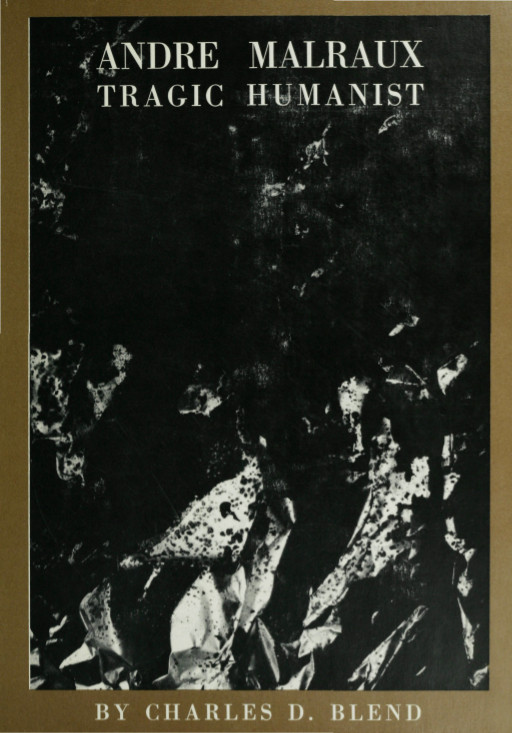Charles D. Blend: André Malraux: Tragic Humanist (1963)
Filed under book | Tags: · art, biography, communism, humanism, poetry, politics

“The dominant question arising from the unparalleled inhumanity of the mid-twentieth century, André Malraux has suggested “Is man dead?” Yet, for him, to pose the question is to answer it, for man proves his greatness, not by affirming it, but by questioning. It is by a mise en question of the universe that man rises above it.
This interpretation, long central to Malraux’s thinking, brings with it a number of difficulties. Previous concepts of man have produced an image, an ideal, toward which man could orient himself, and have presupposed a culture that had a role in the scheme of things. With a vision of man based on questioning rather than affirmation, it becomes impossible to preconceive an image of him or to visualize a form for human culture, and traditional humanism passes from the picture.
For Malraux, however, man has something that is greater than a preconceived image of himself: consciousness or awareness. To replace the images of man that have been destroyed or invalidated, Malraux calls for the will to grasp the greatest possible consciousness of what it is to be a man, coupled with the will to absolutely free discovery. Combining these values, Malraux suggests, produces a culture that is a human adventure, an advehture in freedom. Humanism is still possible, but it is a tragic humanism—humanism, because man knows his will and his starting point; tragic, because he can never know where he is going. Man can lead a dignified and fruitful existence given the will to struggle endlessly with the unknown.”
Publisher Ohio State University Press, 1963
255 pages
Stephen Toulmin: Cosmopolis: The Hidden Agenda of Modernity (1990/1992)
Filed under book | Tags: · 1600s, 1700s, 1800s, 1900s, history, humanism, modernity, philosophy, rationalism, renaissance, society

In the seventeenth century, a vision arose which was to captivate the Western imagination for the next three hundred years: the vision of Cosmopolis, a society as rationally ordered as the Newtonian view of nature. While fueling extraordinary advances in all fields of human endeavor, this vision perpetuated a hidden yet persistent agenda: the delusion that human nature and society could be fitted into precise and manageable rational categories. Stephen Toulmin confronts that agenda—its illusions and its consequences for our present and future world.
Originally published by Free Press, New York, a division of Macmillan, 1990
Publisher University of Chicago Press, 1992
ISBN 0226808386, 9780226808383
240 pages
review (Quentin Skinner, The New York Review of Books)
wikipedia
publisher
google books
Alessandra Petrina: Cultural Politics in Fifteenth-Century England: The Case of Humphrey, Duke of Gloucester (2004)
Filed under book | Tags: · 1400s, cultural politics, england, history, humanism, politics, united kingdom

This volume is an analysis of the development of cultural politics in Lancastrian England. It focusses on Duke Humphrey of Gloucester, brother of Henry V and Protector of England during Henry VI’s minority. Humphrey’s intellectual activity conformed itself to the Duke’s own position in the kingdom: the book explores Humphrey’s commission of biographies, translations of Latin texts, political pamphlets and poems, as well as his collection of manuscripts acquired both in England and from Italian humanists. Particular attention is dedicated to Humphrey’s donations to the University of Oxford and to his relations with English poets and translators, such as John Lydgate and Thomas Hoccleve, highlighting his contribution towards the making of the nation’s cultural autonomy.
Publisher BRILL, 2004
ISBN 9004137130, 9789004137134
381 pages
PDF (updated on 2014-9-5)
Comment (0)
